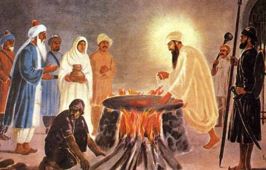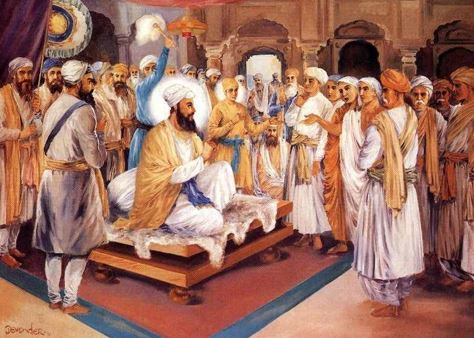The Martyrdom of Sikh Gurus: Stories of Courage, Compassion, and Unshakable Faith
In the heart of Sikh history, some stories move beyond time, tales of sacrifice, compassion, and unwavering faith. Among the most poignant of these are the martyrdoms of the Sikh Gurus. Their sacrifices were not just for the Sikh community but for humanity. These Gurus gave up their lives, not for power or glory but to protect the oppressed, defend religious freedom, and stand as a shield for those who couldn’t defend themselves. Their martyrdoms carry a deep emotional resonance, forever etched in the souls of Sikhs and all those who believe in justice, freedom, and equality.
Guru Arjan Dev Ji: The Painful Sacrifice of the Fifth Guru

The story of Guru Arjan Dev Ji, the fifth Sikh Guru, is one of profound strength in the face of unimaginable pain. He was a man of peace, known for his gentle heart and vision for a harmonious society. He compiled the Adi Granth, gathering the wisdom of not just Sikh Gurus but also Hindu and Muslim saints, to unite people under the shared values of love, compassion, and devotion to the divine.
But the world around him was filled with hostility and intolerance. The growing influence of Sikhism disturbed the Mughal Emperor Jahangir, who saw the community’s unity as a threat to his rule. In his unwavering dedication to the truth, Guru Arjan Dev Ji refused to bow to Jahangir’s demands. His courage to stand by his faith was met with unbearable consequences.
When Guru Arjan Dev Ji was arrested and brought to Lahore, he was subjected to days of torturous agony. His captors forced him to sit on a searing hot iron plate while scalding hot sand was poured over his body. The excruciating pain was unimaginable. Yet, amid that suffering, Guru Arjan Dev Ji sat in meditation, reciting “Tera bhana meetha lage” – “Your will is sweet to me, O Lord.” Despite his body burning, his soul remained untouched by hatred or revenge.
It was not just his life that Guru Arjan Dev Ji gave up; his love and submission to God’s will move millions. His martyrdom was not just a loss but a lesson – a lesson that truth must prevail, even if it means sacrificing everything.
Guru Tegh Bahadur Ji: A Father’s Love and a Warrior’s Sacrifice
Perhaps no story tugs at the heartstrings like that of Guru Tegh Bahadur Ji, the ninth Sikh Guru. He was a man of deep meditation and quiet strength, but when the call came, he did not hesitate to rise and defend those who needed him. At a time when Emperor Aurangzeb was forcibly converting Hindus to Islam, the Kashmiri Pandits, desperate for help, turned to Guru Tegh Bahadur Ji.
In a moment that defines the selflessness of Sikhism, Guru Tegh Bahadur Ji made a decision that would shape the destiny of not just Sikhs but Hindus too. He told the Pandits, “Tell Aurangzeb that if he can convert me, you all will follow.” It was a bold, fearless stand – a father offering his life to protect the children of another faith.
For standing against tyranny, Guru Tegh Bahadur Ji was arrested and brought to Delhi. His loyal companions were tortured and killed in front of his eyes – Bhai Mati Das was sawed in half, Bhai Sati Das was wrapped in cotton and set on fire, and Bhai Dayala Ji was boiled alive. Yet, Guru Tegh Bahadur Ji remained unwavering, his heart filled with the love of humanity.
On November 24, 1675, in the bustling marketplace of Chandni Chowk, Guru Tegh Bahadur Ji was beheaded for refusing to convert to Islam. As his head fell, it wasn’t just his physical body that was sacrificed, but his soul became immortal, forever symbolizing the ultimate stand for religious freedom. His last words were not of fear but of profound surrender to God’s will, “I have given my head but not my faith.”
The grief that followed his death was immense. But even in grief, there was pride – the pride of knowing that Guru Tegh Bahadur Ji had become a martyr not just for Sikhs but for the right of all people to live by their beliefs. His sacrifice was a father’s love for all of humanity, an act of protection so pure that it has moved generations to tears.
Martyrdom: The Heartbeat of Sikhism
The martyrdoms of Guru Arjan Dev Ji and Guru Tegh Bahadur Ji live on in the heart of every Sikh as a reminder that true courage comes from standing up for the oppressed, from offering oneself for the sake of justice. These Gurus did not fight with swords; they fought with their souls. They gave their lives not to take others but to protect them.
Through their sacrifices, they showed the world that the power of truth is more significant than any empire and that the strength of faith can overcome even the most brutal tyranny. Guru Arjan Dev Ji’s quiet acceptance of death and Guru Tegh Bahadur Ji’s defiance in the face of conversion are woven into the very fabric of Sikhism.
In their martyrdom, the Gurus showed us what it means to live fearlessly. They taught us that there is no more incredible honor than to serve and protect others and that the true path of Sikhism is not just in devotion to God but in defending the dignity and freedom of all people.
Conclusion: A Legacy of Love and Sacrifice
Guru Arjan Dev Ji and Guru Tegh Bahadur Ji’s stories fill our hearts with sorrow and pride. Their martyrdoms are more than historical events; they are sacred stories of love, faith, and sacrifice that continue to inspire and guide us. As we remember their martyrdoms, let us not just mourn their deaths but celebrate their lives – their kindness, their strength, and their unshakable belief in justice. They gave everything so we could live in a world where faith is free, and truth reigns supreme.
Their legacy is not just etched in the pages of history but lives on in the hearts of every Sikh who walks in the path of service, sacrifice, and love.


Leave a Reply